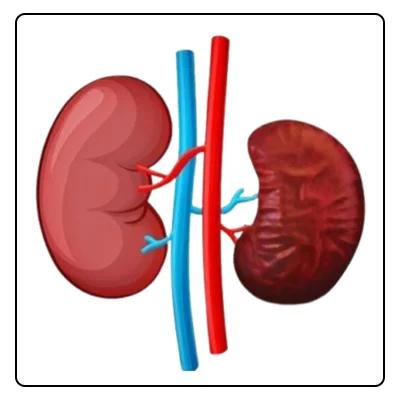Introduction
Kidney shrinkage, also known as renal atrophy, is a condition where the kidneys decrease in size due to various underlying medical issues. This can lead to impaired kidney function, increasing the risk of chronic kidney disease (CKD) and kidney failure. Understanding the causes, symptoms, and treatment options for kidney shrinkage is crucial for managing the condition effectively and preventing further complications.
Anatomy and Function of the Kidneys
The kidneys are two bean-shaped organs located on either side of the spine, just below the rib cage. Their primary function is to filter waste products, excess fluids, and toxins from the blood, producing urine that is excreted through the urinary tract. The kidneys also help regulate blood pressure, balance electrolytes, and produce hormones essential for red blood cell production and bone health.
When the kidneys shrink or deteriorate, they lose their ability to perform these vital functions, which can lead to serious health issues.
Causes of Kidney Shrinkage
Several factors can contribute to kidney shrinkage, including:
1. Chronic Kidney Disease (CKD)
One of the most common causes of kidney shrinkage is chronic kidney disease. CKD is a progressive condition where kidney function declines over time due to damage from high blood pressure, diabetes, or other diseases. As the kidneys deteriorate, they lose mass and shrink.
2. Hypertension (High Blood Pressure)
High blood pressure can damage the blood vessels in the kidneys, leading to reduced blood flow and impaired kidney function. Over time, this damage can cause the kidneys to shrink as their filtering ability diminishes.
3. Diabetes
Uncontrolled diabetes leads to diabetic nephropathy, where high blood sugar levels damage the small blood vessels in the kidneys. This results in decreased kidney function and eventual shrinkage.
4. Urinary Tract Obstruction
Blockages in the urinary tract, such as kidney stones, tumors, or an enlarged prostate, can cause urine to back up into the kidneys, leading to swelling, scarring, and atrophy.
5. Glomerulonephritis
Glomerulonephritis is an inflammation of the kidney’s filtering units (glomeruli). Chronic inflammation can result in scarring and shrinking of the kidneys over time.
6. Renal Artery Stenosis
A condition where the arteries supplying blood to the kidneys become narrowed, reducing blood flow. This lack of oxygen and nutrients leads to kidney shrinkage.
7. Congenital Disorders
Some individuals are born with smaller or underdeveloped kidneys due to genetic conditions, which can lead to kidney shrinkage over time.
8. Recurrent Kidney Infections (Pyelonephritis)
Frequent kidney infections can cause scarring, reducing kidney size and function.
Symptoms of Kidney Shrinkage
Kidney shrinkage may not produce symptoms in the early stages, but as the condition progresses, signs may include:
-
Fatigue and weakness
-
Swelling in the legs, feet, and ankles due to fluid retention
-
Changes in urination patterns (frequent urination, foamy urine, blood in urine)
-
High blood pressure
-
Nausea and vomiting
-
Loss of appetite and weight loss
-
Shortness of breath (due to fluid accumulation in the lungs)
-
Persistent back or flank pain (in cases of kidney infection or obstruction)
Diagnosis of Kidney Shrinkage
To diagnose kidney shrinkage, doctors use several tests, including:
1. Blood Tests
-
Serum Creatinine: Elevated levels indicate reduced kidney function.
-
Blood Urea Nitrogen (BUN): High levels suggest impaired kidney function.
-
Glomerular Filtration Rate (GFR): Measures kidney function and determines the stage of kidney disease.
2. Urine Tests
-
Urinalysis: Checks for protein, blood, or infections in urine.
-
Microalbuminuria Test: Detects small amounts of protein leakage, an early sign of kidney disease.
3. Imaging Tests
-
Ultrasound: Identifies kidney size, structure, and abnormalities.
-
CT Scan or MRI: Provides detailed images of the kidneys to detect blockages, tumors, or vascular issues.
-
Renal Doppler Ultrasound: Assesses blood flow to the kidneys.
4. Kidney Biopsy
In some cases, a small tissue sample is taken from the kidney for microscopic examination to determine the cause of kidney shrinkage.
Treatment and Management of Kidney Shrinkage
Treatment depends on the underlying cause and the extent of kidney damage. Common management strategies include:
1. Medications
-
Blood Pressure Control: ACE inhibitors and ARBs help manage hypertension and slow kidney deterioration.
-
Diabetes Management: Insulin or oral medications help control blood sugar levels.
-
Diuretics: Reduce fluid retention and swelling.
-
Antibiotics: Treat infections that may cause kidney damage.
-
Anti-inflammatory Drugs: Manage autoimmune conditions like glomerulonephritis.
2. Dietary Modifications
-
Low-Sodium Diet: Reduces fluid retention and controls blood pressure.
-
Low-Protein Intake: Minimizes kidney workload while maintaining necessary nutrients.
-
Balanced Potassium and Phosphorus Levels: Prevents electrolyte imbalances.
-
Hydration: Ensures proper kidney function and prevents urinary tract infections.
3. Lifestyle Changes
-
Regular exercise to maintain cardiovascular health.
-
Avoid smoking and excessive alcohol intake, which can worsen kidney function.
-
Managing stress to prevent hypertension and diabetes complications.
4. Surgical and Interventional Procedures
-
Angioplasty and Stenting: For renal artery stenosis to restore blood flow.
-
Nephrectomy: In severe cases, the affected kidney may need removal.
-
Dialysis: If kidney function is severely compromised, dialysis helps filter waste products.
-
Kidney Transplant: In end-stage kidney disease, a transplant may be the only long-term solution.
Prevention Strategies
While some causes of kidney shrinkage are unavoidable, adopting preventive measures can reduce the risk:
-
Maintain healthy blood pressure and blood sugar levels.
-
Stay hydrated and follow a kidney-friendly diet.
-
Avoid overuse of NSAIDs and other nephrotoxic drugs.
-
Get regular medical check-ups for early detection of kidney disease.
-
Address urinary tract infections promptly to prevent complications.
Conclusion
Kidney shrinkage is a serious medical condition that can lead to chronic kidney disease and kidney failure if left untreated. Early detection, lifestyle modifications, and medical interventions can help slow the progression of the disease and improve overall kidney health. If you experience symptoms of kidney shrinkage, seek medical attention promptly to prevent further complications and preserve kidney function.
